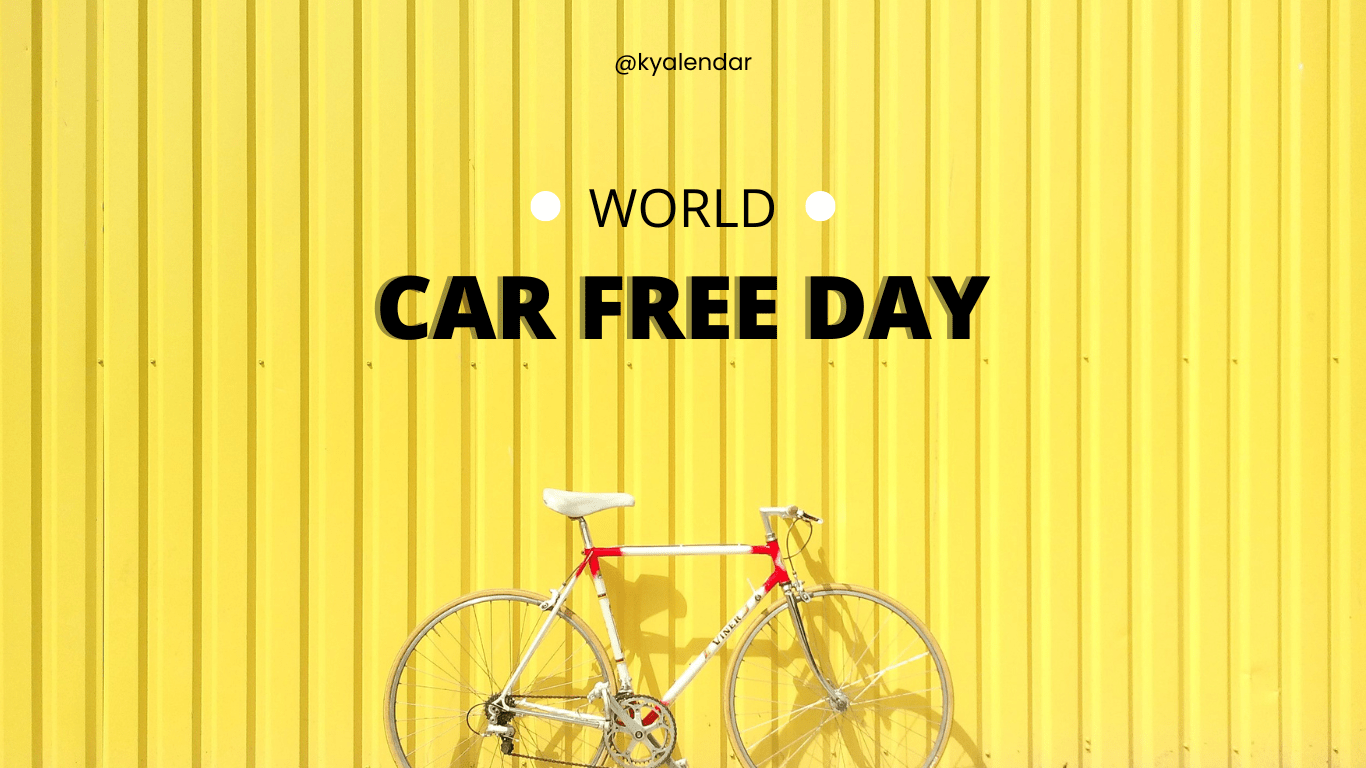
- This event has passed.
World Car Free Day
September 22

World Car Free Day, observed annually on September 22nd, is a global event dedicated to promoting alternative modes of transportation and reducing reliance on cars. This day encourages people to leave their cars at home and explore other ways of getting around, such as walking, cycling, or using public transport. It serves as a powerful reminder of the environmental and health benefits associated with reducing car usage and highlights the need for more sustainable urban planning.
The Purpose of World Car Free Day
World Car Free Day aims to raise awareness about the impact of car dependency on the environment and public health. By encouraging individuals to forgo their cars for a day, the event highlights the benefits of alternative transportation methods and the potential for reducing traffic congestion, air pollution, and greenhouse gas emissions.
The day also serves to demonstrate the advantages of more pedestrian-friendly and cyclist-friendly urban environments. It promotes the idea that cities can be more liveable and enjoyable when they are designed to accommodate a variety of transportation options beyond private vehicles.
The Impact of Car Usage
Car usage has a significant impact on both the environment and public health. Some of the key issues associated with high levels of car dependency include:
- Air Pollution: Cars are a major source of air pollution, emitting harmful pollutants such as nitrogen oxides and particulate matter. These pollutants can contribute to respiratory problems, cardiovascular diseases, and other health issues.
- Greenhouse Gas Emissions: Cars produce carbon dioxide (CO2), a greenhouse gas that contributes to global warming and climate change. Reducing car usage can help mitigate these environmental impacts.
- Traffic Congestion: High levels of car usage lead to traffic congestion, which can result in longer travel times, increased stress, and higher levels of fuel consumption.
- Dependence on Fossil Fuels: Cars are primarily powered by fossil fuels, which are finite resources and contribute to environmental degradation. Promoting alternative transportation methods can help reduce this dependence.
How to Participate in World Car Free Day
Participating in World Car Free Day can be both enjoyable and beneficial. Here are some ways to get involved:
- Opt for Alternative Transportation: Instead of driving, consider walking, cycling, or using public transport for your daily commute. These alternatives reduce your carbon footprint and promote a healthier lifestyle.
- Organise or Join Local Events: Many cities host events and activities to celebrate World Car Free Day. These can include car-free zones, community bike rides, and public transport promotions. Check local listings for events in your area.
- Promote Carpooling: If you need to travel by car, consider carpooling with others to reduce the number of vehicles on the road and share the environmental benefits.
- Support Sustainable Transport Initiatives: Advocate for and support initiatives that promote sustainable transportation, such as improved cycling infrastructure, expanded public transit options, and pedestrian-friendly urban design.
- Spread the Word: Use social media, community groups, and other platforms to raise awareness about World Car Free Day and encourage others to participate.
Benefits of Car-Free Living
Embracing car-free living, even if just for a day, offers a range of benefits:
- Environmental Benefits: Reducing car usage lowers greenhouse gas emissions and air pollution, contributing to a cleaner environment and helping combat climate change.
- Health Benefits: Walking or cycling instead of driving provides physical exercise, which can improve cardiovascular health, reduce stress, and boost overall well-being.
- Economic Savings: Using alternative transportation can lead to savings on fuel, parking, and vehicle maintenance. It can also reduce the financial burden associated with owning and operating a car.
- Community Engagement: Car-free activities often foster a sense of community and encourage social interactions. They provide opportunities to connect with neighbours and participate in local events.
Promoting Sustainable Urban Planning
World Car Free Day also highlights the importance of sustainable urban planning. Cities that prioritise alternative transportation options and green spaces create more liveable environments for residents. Key aspects of sustainable urban planning include:
- Improving Public Transport: Expanding and enhancing public transportation options makes it easier for people to choose alternatives to driving.
- Developing Cycling Infrastructure: Creating dedicated bike lanes and bike-sharing programs encourages cycling as a safe and convenient mode of transport.
- Designing Walkable Neighbourhoods: Designing cities to be pedestrian-friendly with safe sidewalks, crossings, and green spaces promotes walking and reduces car dependency.
- Encouraging Mixed-Use Development: Building mixed-use areas that combine residential, commercial, and recreational spaces reduces the need for long commutes and supports local economies.
Looking Ahead
World Car Free Day is more than just a one-day event; it is a call to action for adopting more sustainable transportation practices and rethinking our reliance on cars. By participating in the event, individuals and communities can contribute to a healthier environment and a more vibrant, interconnected urban experience.
As we observe World Car Free Day, let us embrace the opportunity to explore alternative modes of transport and support initiatives that promote sustainability. By making small changes in our daily routines, we can collectively work towards a future where cities are more sustainable, healthy, and enjoyable places to live.
In summary, World Car Free Day serves as a valuable reminder of the impact of car usage on the environment and public health. It encourages us to explore alternative transportation options, advocate for sustainable urban planning, and make choices that contribute to a cleaner, healthier world.